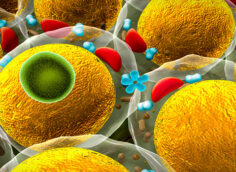BPA: Safe or Not?
Avoid canned food. Don't drink out of plastic containers. And for heaven's sake, don't hold that plastic phone to your face! They all contain bisphenol A (BPA), the estrogen-mimicking chemical that can affect the brain, the balls, the prostate glands of fetuses (yes!), and possibly increase blood pressure.
Well, it turns out that advice – which I personally have been guilty of disseminating – is pretty much wrong. BPA will not feminize males. Neither will it do any of those other horrible things. In fact, it's fairly benign.
The Birth of a "Monster"
People started freaking out a few years ago when it was reported that BPA is a powerful estrogen mimicker and that it's present inside the lacquer liners of approximately 70% of all canned foods, in addition to our water bottles, medical supplies, CDs, and pretty much anything plastic.
Unfortunately, hardly anyone bothered to look at the fine print in the research. Yes, BPA binds to estrogen receptors and it's indeed found in a whole bunch of plastic products, but it binds to the receptors very poorly.
Now, estradiol binds perfectly to estrogen receptors. The binding capacity is 1 to 1. BPA, however, has a binding capacity of 10,000 to 1. That means that out of every 10,000 BPA molecules floating around your bloodstream, only one of them binds to an estrogen receptor.
Contrast that with the soy isoflavone genistein, which has an estrogen binding ratio of 250 to 1. The irony is that genistein – found naturally in soy proteins – is sold as a health supplement that allegedly treats prostate and breast cancer, in addition to fighting heart disease.
If genistein, a powerful estrogen mimicker, is a "health" supplement, why is BPA, the much weaker estrogen mimicker, somehow toxic?
More Reasons Not to Fear BPA
- The initial studies that cast aspersion on BPA used amounts far greater than what the average human would be exposed to in a day.
- Even if BPA were a problem, the liver detoxifies it and prevents it from binding to estrogen receptors.
- BPA is excreted through the urine or bile in 5-7 hours after being ingested.
It's a good idea to avoid unnecessary chemicals of any kind, but let's concentrate on identifying the ones that are truly problematic. BPA isn't one of them.





